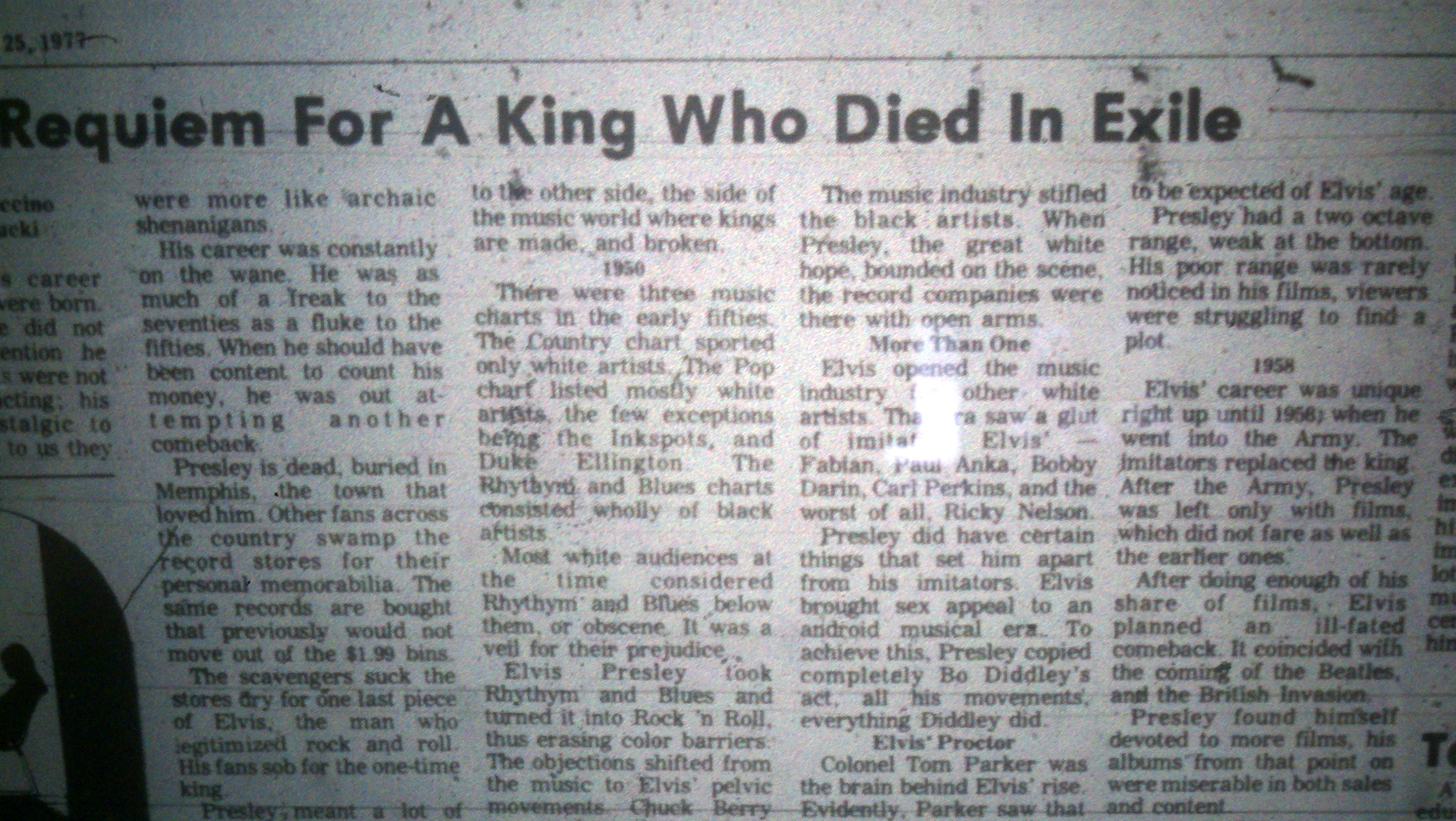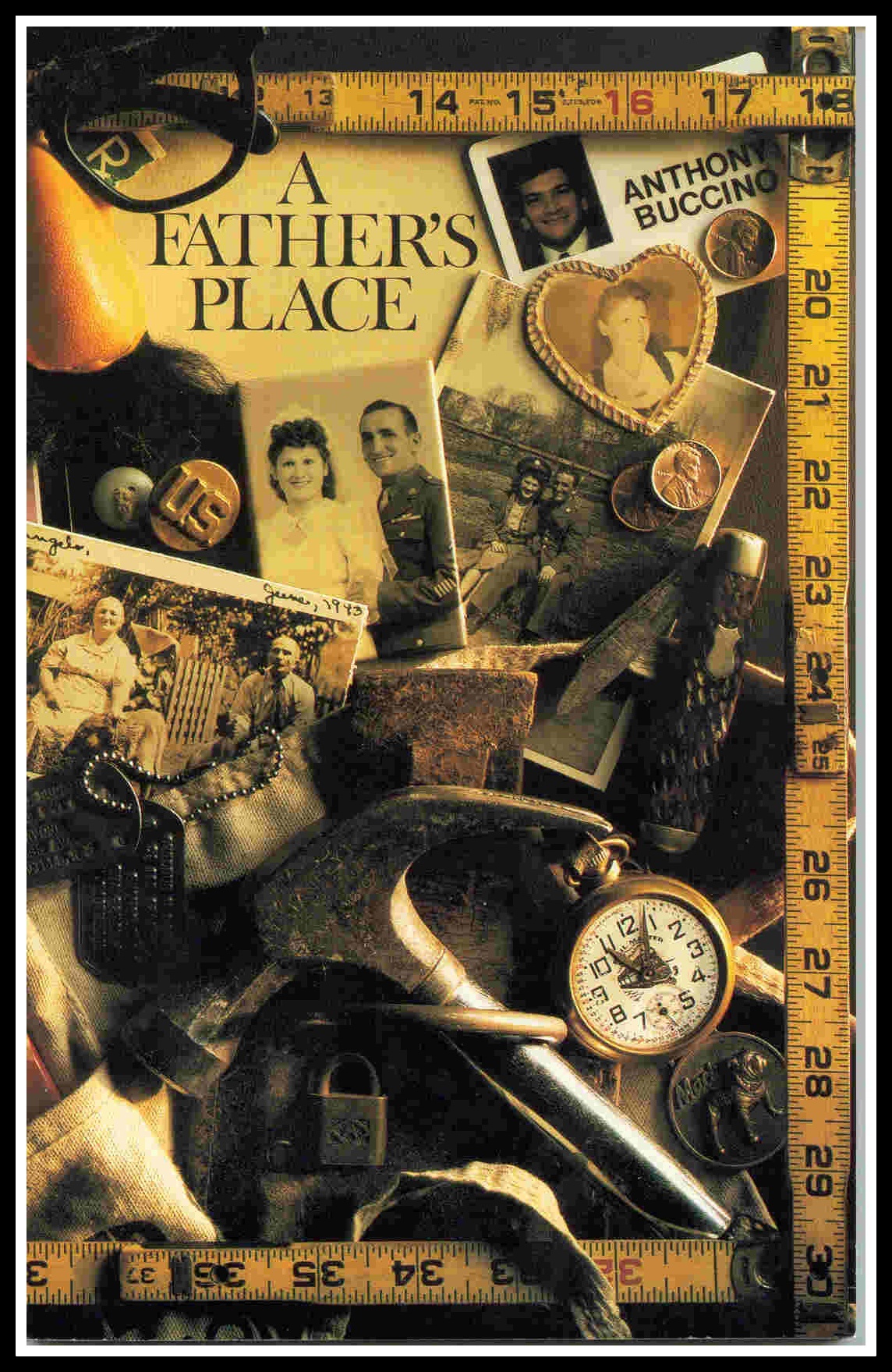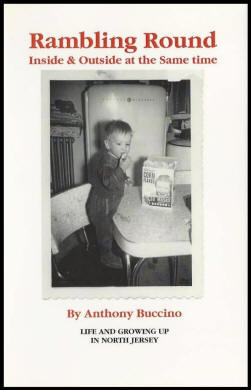|
Presley meant a lot of
good things to a lot of people.
Somehow, through his music, or
through his films, or through his generosity, he touched them.
The touch of a kind king.
Elvis Presley, Jan. 8, 1935 to August 16, 1977
Elvis
Presley’s career began before we were born. For our part, he
did not warrant the attention he received. His films were not great,
nor his acting; his songs were nostalgic to older people, but to us
they were more like archaic shenanigans.
His
career was constantly on the wane. He was as much of a freak to the
seventies as a fluke to the fifties. When he should have been
content to count his money, he was out attempting another comeback.
Presley
is dead, buried in Memphis, the town that loved him. Other fans
across the country swamp the record stores for their personal
memorabilia. The same records are bought that previously would not
move out of the $1.99 bin.
 The
scavengers suck the stores dry for one last piece of Elvis, the man
who legitimized rock and roll. His fans sob for the one-time king. The
scavengers suck the stores dry for one last piece of Elvis, the man
who legitimized rock and roll. His fans sob for the one-time king.
Presley
meant a lot of good things to a lot of people. Somehow, through his
music, or through his films, or through his generosity, he touched
them. The touch of a kind king.
Elvis
wasn’t always a king, he started small, in country music, and at the
right time, broke on through to the other side, the side of the music
world where kings are made, and broken.
1950
There
were three music charts in the early fifties. The Country chart
supported only white artists. The Pop chart listed mostly white
artists, the few exceptions being the Ink Spots, and Duke Ellington.
The Rhythm and Blues charts consisted wholly of black artists.
Most
white audiences at the time considered Rhythm and Blues below them,
or obscene. It was a veil for their prejudice.
Elvis
Presley took Rhythm and Blues and turned it into Rock ‘n Roll, thus
erasing color barriers. The objections shifted from the music to
Elvis’ pelvic movements. Chuck Berry was a better musician; Little
Richard, a more frantic performer; Richie Valens a better singer.
Their failure laid in their color. Elvis garnered all the attention.
Presley
made 31 movies. Chuck Berry, a better musician and singer, appeared
in only four movies.
The
music industry stifled the black artists. When Presley, the great
white hope, bounded on the scene, the record companies were there
with open arms.
More
Than One
Elvis opened the music industry for
other white artists. That era saw a glut of imitation Elvises –
Fabian, Paul Anka, Bobby Darin, Carl Perkins, and the worst of all,
Ricky Nelson.
Presley
did have certain things that set him apart from his imitators. Elvis
brought sex appeal to an android musical era. To achieve this,
Presley copied completely Bo Diddley’s act, all his movements,
everything Diddley did.
Elvis’
Proctor
Colonel
Tom Parker was the brain behind Elvis’ rise. Evidently, Parker saw
that Bo Diddley could make a million bucks with his style – except
that Diddley was black.
Parker
groomed Elvis into a pale version of Bo Diddley. Parker then went
out of his way to find the best back-up musicians available to
disguise the lack of actual musical talent to be expected of Elvis’
age.
Presley
had a two octave range, weak at the bottom. His poor range was
rarely noticed in his film, viewers were struggling to find a plot.
1958
Elvis’
career was unique right up until 1958, when he went into the Army.
The imitators replaced the king. After the Army, Presley was left
only with films, which did not fare as well as the earlier ones.
After
doing enough of his share of films, Elvis planned an ill-fated
comeback. It coincided with the coming of The Beatles, and the
British Invasion.
Presley
found himself devoted to more films, his albums from that point on
were miserable in both sales and content.
1968
Presley’s
second comeback came through a Mac Davis vehicle called “In The
Ghetto.” His comeback picked up momentum.
However,
Presley fell out of the rock ‘n roll mainstream. He was still
drawing hard-core fans, playing the big halls and Las Vegas.
Presley, failing to gain any new fans retreated into his own
microcosm of guns, bodyguards, divorce and obesity.
1972
Presley’s
last gasp at being “King of Rock ‘n Roll” came in 1972 with the
release of the film, “Elvis, The Way It Is,” subtitled “Elvis On
Tour.”
“Elvis
On Tour,” a documentary about his onstage performances, is probably
his best film. His acting couldn’t be faulted; he did not do any.
It’s a film of his act, a tribute to the fact that Elvis NEVER lost
his stage appeal.
Influenced
By The Herd
Between
1972 and his death, Elvis had gained weight and curtailed his
appearances. Like Lenny Bruce, Presley’s final appearances were
artistically unimportant. Like Bruce, Presley was more important as
an influence than as a performer.
To the
end, his publicity maintained Presley was the “King of Rock ‘n
Roll.” In the face of artists such as Bob Dylan, Mick Jagger and
Peter Frampton, Presley’s claim to the crown in the last two decades
is weak at best.
At one
time, Elvis Presley was the king, but when he died he was more the
king in exile. For a man who imitated others, and was himself
obliterated by imitators, he sure made a lot of people happy with
his music. Rock ‘n roll certainly will not forget him.
First published in The Independent Press of Bloomfield
on August 25, 1977.
Copyright 1977, 2014 by Anthony Buccino and
J.B. Narucki, all rights reserved.

A Dead King - Opinions Differ
click photo to read low
quality images.
Email Comments on Requiem For A King Who Died In Exile
|















